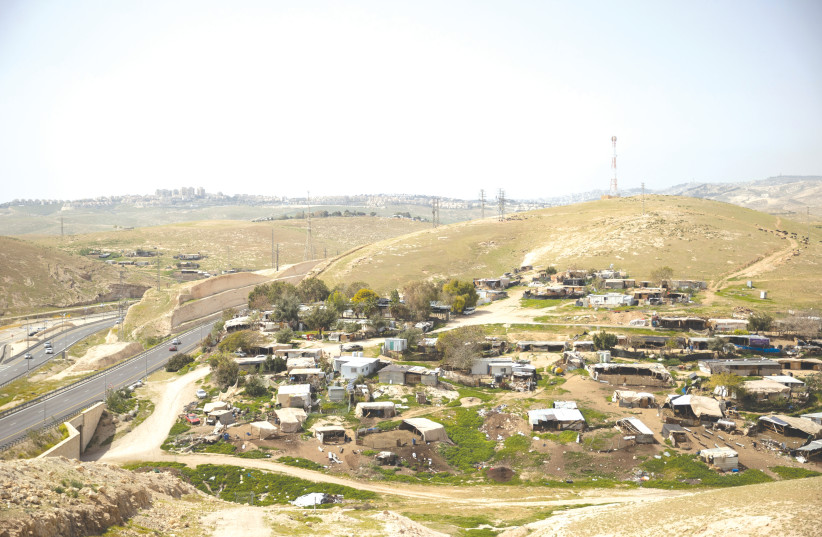You can count on certain things in Israel taking place every year. The holiday season beginning Monday night is one of them. And joining it as a perennial on the calendar seems to be the continuing fiasco over Khan al-Ahmar.
Whereas the holidays warm our hearts and remind us what it means to be a free people in our land, the contretemps, obfuscation, and nonsensical politicking, and foot-dragging over Khan al-Ahmar reveal how we continue to fail to realize the responsibility of dealing with the country we run.
The story of Khan al-Ahmar, a small encampment of Bedouin, just off the road past Ma’aleh Adumim on the way to the Dead Sea, is one of disputed narratives and questions of ownership, just like other areas of Bedouin settlement that have become endless court cases. Khan al-Ahmar consists of some 180 Jahalin Bedouin who might have moved there in the 1950s, but that “fact” is dependent on who you talk to. The issue of where they came from and when is largely irrelevant today.
Human rights groups claim that Israel has for years been seeking to “forcibly transfer the community,” as B’Tselem asserted in 2018. Regardless of the details of how the people got there and whether they were expelled before, what matters is that this small community of rural people living in shacks near a highway has become an endless dispute.
The dispute involves the state’s desire to raze the village and relocate its residents. Every year the state reiterates its plans, and it results in a media storm and international lobbying to not have the place harmed. The same state that wants Khan al-Ahmar removed is now asking the High Court of Justice to delay the plans for another year and a half.
Reports say that news of the delay was announced by the Foreign Ministry, which is not typically the address for issues involving Israeli demolitions of illegal Bedouin and Palestinian construction.
“Based on inter-agency staff work that includes a diplomatic opinion from the Foreign Ministry, the state will [on September 5] submit a request for a six-month postponement of the evacuation of Khan al-Ahmar,” the Foreign Ministry said.

The right-wing lobby group Regavim forced the government to move by asking the court and state to follow the law and remove the village. But Israel’s decisions are not made in a vacuum. Former prime minister Benjamin Netanyahu was supposed to carry out the decision in 2018 and demolish the tents and shacks that were home to Khan al-Ahmar Bedouin. But he backed down after complaints from the US, other Western countries, and International Criminal Court Chief Prosecutor Fatou Bensouda.
Foreign Minister Yair Lapid is correct in asserting the bulldozing Bedouin tents and removing kids from their school isn’t good for Israel’s image. The new government’s initiative to work with Jordan, Morocco, and other countries, host leading Democratic US Senators, and engage with liberal voices in Europe again would face a huge obstacle if it okays bulldozing a village.
That argument doesn’t hold water, however, with those who want Khan al-Ahmar gone. Regavim added in a statement, “Under no circumstances should law enforcement policy in the State of Israel be dictated by pressure exerted by foreign governments. This is a perilous, slippery slope that erodes Israeli sovereignty.”
Of course, there are laws, but a look at the country’s history shows a pragmatic view that has often strove to find a middle ground between law and necessity. Israel’s laws are often not even carried out in the Negev, where there is mass illegal Bedouin settlement.
So why must the law be carried out for a few dozen people in shacks in the West Bank? Assuming the Bedouin would even be amenable to the idea, wouldn’t it be better to build homes for them and standardize their living standards than pretend, every year, that tomorrow the bulldozers will come?
Israel needs to decide what it wants to do. Continuously postponing the removal of Khan al-Ahmar is not a strategy. It is kicking the can down the road. A country should know how to do better.
